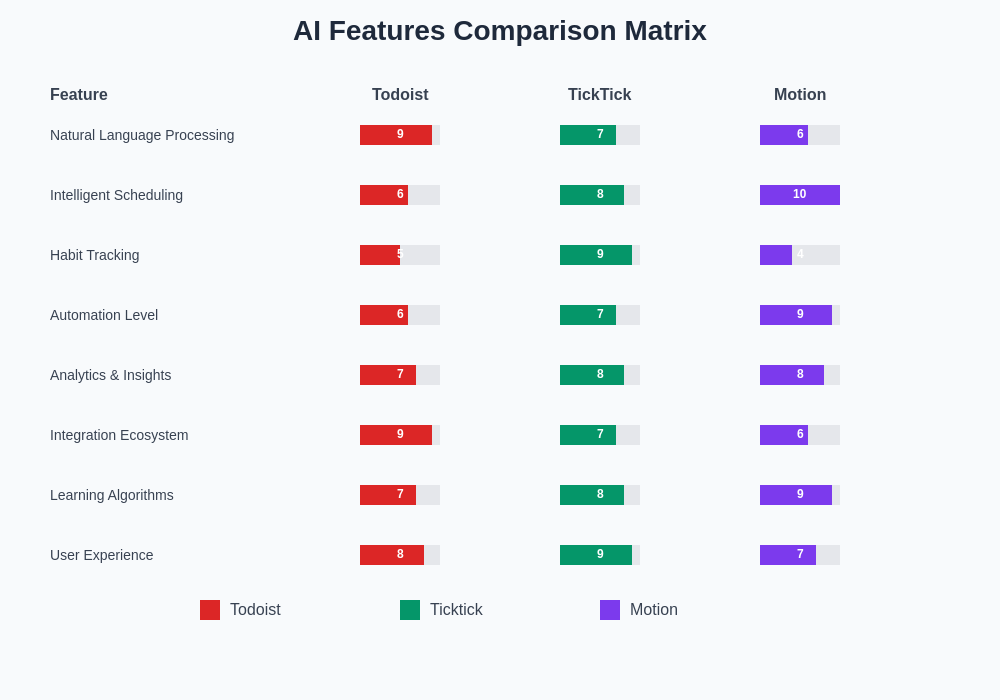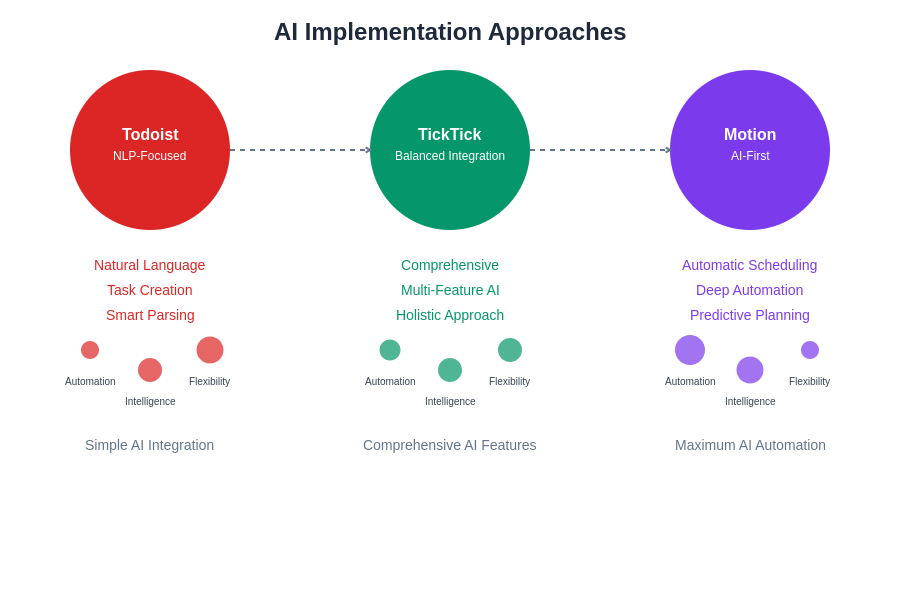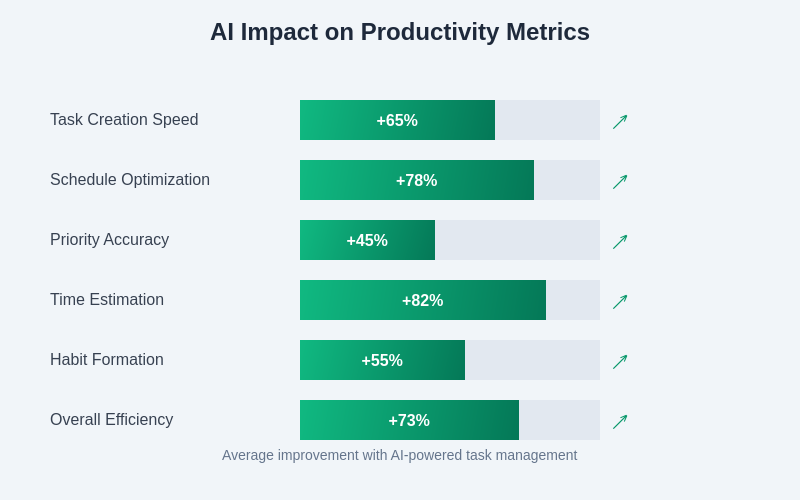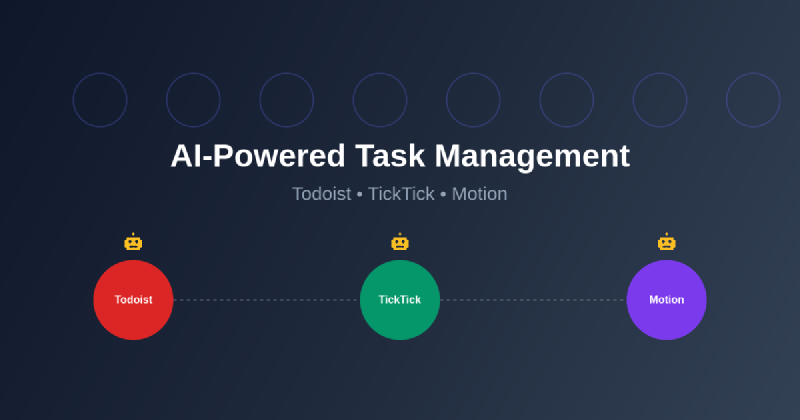The evolution of task management has reached an inflection point where artificial intelligence transforms simple to-do lists into intelligent productivity ecosystems that anticipate needs, optimize schedules, and adapt to individual working patterns. Among the leading platforms pioneering this revolution, Todoist, TickTick, and Motion represent distinct approaches to integrating AI capabilities into task management workflows, each offering unique strengths that cater to different productivity philosophies and user requirements.
Discover the latest AI productivity trends that are reshaping how professionals manage their daily workflows and optimize their time allocation strategies. The integration of artificial intelligence into task management represents a fundamental shift from reactive organization systems to proactive productivity partners that learn from user behavior and continuously optimize task prioritization and scheduling algorithms.
The AI Revolution in Task Management
Traditional task management applications served primarily as digital repositories for reminders and basic organizational structures, requiring users to manually categorize, prioritize, and schedule their activities without intelligent assistance or adaptive learning capabilities. The introduction of artificial intelligence has fundamentally transformed this paradigm by enabling task management platforms to become sophisticated productivity partners that understand context, predict requirements, and automatically optimize workflows based on historical patterns and real-time constraints.
Modern AI-powered task management systems leverage machine learning algorithms to analyze user behavior, identify productivity patterns, and make intelligent recommendations about task prioritization, time allocation, and scheduling optimization. These systems can automatically categorize incoming tasks, suggest optimal completion times based on energy levels and calendar availability, and even predict potential bottlenecks or conflicts before they impact productivity outcomes.
The sophistication of contemporary AI task management extends beyond simple automation to encompass predictive analytics, natural language processing for intuitive task creation, and adaptive scheduling that responds to changing priorities and unexpected interruptions. This evolution has created a new category of productivity tools that serve not merely as organizational aids but as intelligent assistants capable of enhancing human decision-making and optimizing workflow efficiency.
Todoist: Pioneering Natural Language Processing
Todoist has established itself as a frontrunner in AI-powered task management through its sophisticated natural language processing capabilities and intelligent task recognition systems. The platform’s AI engine excels at interpreting natural language input, automatically extracting dates, times, and project associations from conversational text entries, enabling users to create complex task structures using intuitive, human-like communication patterns.
The platform’s intelligent task creation system can parse entries like “Call the marketing team next Tuesday at 3 PM regarding the Q1 campaign review” and automatically generate appropriately scheduled tasks with relevant project associations and priority levels. This natural language processing capability extends to recurring task patterns, deadline recognition, and contextual categorization that adapts to individual user terminology and organizational preferences.
Experience advanced AI capabilities with Claude for enhanced productivity workflows that integrate seamlessly with task management systems and provide comprehensive support for complex project coordination requirements. Todoist’s integration capabilities allow for sophisticated workflow automation that connects task management with broader productivity ecosystems.
Todoist’s AI-driven features include intelligent project templates that adapt to user preferences, automated task delegation suggestions based on team member availability and expertise, and predictive text completion that accelerates task entry while maintaining accuracy and context relevance. The platform’s machine learning algorithms continuously refine these capabilities by analyzing user interaction patterns and adjusting suggestions to align with individual productivity preferences and organizational workflows.
The platform’s karma system incorporates AI-driven motivation techniques that analyze completion patterns and provide personalized encouragement and goal-setting recommendations. This gamification approach, enhanced by artificial intelligence, creates adaptive motivation systems that respond to individual productivity rhythms and provide customized incentives for maintaining consistent task completion rates.
TickTick: Comprehensive AI Integration
TickTick distinguishes itself through comprehensive AI integration that encompasses multiple aspects of task management, from intelligent scheduling and priority optimization to automated habit tracking and productivity analytics. The platform’s artificial intelligence engine operates across various dimensions of task management, creating a holistic productivity environment that adapts to user needs and continuously optimizes workflow efficiency.
The platform’s AI-powered scheduling system analyzes calendar availability, task complexity estimates, and historical completion patterns to suggest optimal time slots for task execution. This intelligent scheduling considers factors such as energy levels throughout the day, meeting schedules, and task dependencies to create realistic and achievable daily plans that maximize productivity while preventing overcommitment and burnout.
TickTick’s habit tracking capabilities leverage machine learning algorithms to identify patterns in user behavior and provide personalized recommendations for habit formation and maintenance. The AI system can detect when users are most likely to successfully complete specific types of tasks and suggest scheduling adjustments that align with natural productivity rhythms and behavioral tendencies.
The platform’s intelligent notification system uses artificial intelligence to optimize reminder timing and frequency, learning from user response patterns to deliver notifications at moments when they are most likely to result in positive action rather than interruption or distraction. This adaptive approach to notification management helps maintain productivity flow while ensuring important tasks receive appropriate attention.

The comprehensive analysis of AI features across the three platforms reveals distinct strengths and specialization areas, with each platform excelling in different aspects of artificial intelligence implementation and user experience optimization.
TickTick’s AI-driven analytics provide comprehensive insights into productivity patterns, identifying trends in task completion rates, optimal working hours, and potential areas for workflow improvement. These analytics extend beyond simple completion statistics to encompass qualitative assessments of task difficulty, energy expenditure, and satisfaction levels, creating a comprehensive picture of productivity health and optimization opportunities.
Motion: AI-First Approach to Productivity
Motion represents the most aggressive implementation of artificial intelligence in task management, positioning AI as the central orchestrator of productivity workflows rather than a supplementary feature. The platform’s AI-first philosophy permeates every aspect of task management, from initial task creation and prioritization to dynamic scheduling optimization and real-time workflow adaptation.
The platform’s artificial intelligence engine automatically generates optimal daily schedules by analyzing task priorities, estimated completion times, calendar constraints, and individual productivity patterns. This dynamic scheduling system continuously adjusts throughout the day in response to completed tasks, unexpected interruptions, and changing priorities, ensuring that schedules remain realistic and achievable despite inevitable variations in daily workflows.
Explore comprehensive research capabilities with Perplexity to enhance task management strategies with data-driven insights and evidence-based productivity optimization techniques. Motion’s integration with research and analysis tools creates powerful workflows for complex project management and strategic planning initiatives.
Motion’s AI-driven approach extends to automatic task creation from emails, meeting notes, and project requirements, using natural language processing to extract actionable items and integrate them seamlessly into existing workflow structures. The platform’s intelligent parsing capabilities can identify tasks within complex communications and automatically assign appropriate priorities, deadlines, and project associations based on contextual analysis.
The platform’s machine learning algorithms continuously analyze user behavior to optimize task estimation accuracy, improving the precision of time allocation predictions and schedule optimization over time. This learning capability enables Motion to become increasingly effective at creating realistic schedules that account for individual working patterns, task complexity variations, and environmental factors that impact productivity.
Motion’s AI system also incorporates predictive analytics that can identify potential scheduling conflicts, resource constraints, and deadline risks before they become critical issues. This proactive approach enables users to address potential problems early and maintain consistent productivity levels despite complex project requirements and changing priorities.
Comparative Analysis of AI Features
The three platforms demonstrate distinct approaches to artificial intelligence integration, each offering unique advantages that appeal to different user preferences and productivity requirements. Todoist excels in natural language processing and intuitive task creation, making it ideal for users who prefer conversational interfaces and organic task management workflows that adapt to individual communication styles and organizational preferences.
TickTick provides the most comprehensive feature set with balanced AI integration across scheduling, habit tracking, and analytics, making it suitable for users who desire extensive functionality without overwhelming complexity. The platform’s holistic approach to productivity management creates an integrated environment where multiple productivity dimensions receive intelligent support and optimization.
Motion’s AI-first approach offers the most sophisticated automatic scheduling and workflow optimization, appealing to users who prefer minimal manual intervention and maximum AI-driven productivity management. The platform’s aggressive automation approach works best for individuals with complex schedules who benefit from intelligent orchestration of competing priorities and dynamic workflow optimization.

Each platform demonstrates a unique philosophy toward AI integration, ranging from specialized natural language processing enhancement to comprehensive automation-first productivity management systems.
Advanced Scheduling Intelligence
The implementation of advanced scheduling intelligence represents one of the most significant differentiators among AI-powered task management platforms. Each platform approaches intelligent scheduling with distinct algorithms and optimization strategies that reflect different philosophies about balancing automation with user control and preferences.
Todoist’s scheduling intelligence focuses on contextual awareness and natural language interpretation, enabling users to express scheduling preferences in conversational terms that the AI system translates into specific calendar entries and task arrangements. The platform’s scheduling algorithms prioritize user intent and natural workflow patterns over rigid optimization formulas, creating schedules that feel intuitive and aligned with individual working preferences.
TickTick’s scheduling system emphasizes comprehensive optimization that considers multiple variables including energy levels, task complexity, calendar availability, and historical completion patterns. The platform’s AI algorithms create balanced schedules that optimize for both productivity and sustainability, preventing overcommitment while maximizing task completion rates and maintaining consistent progress toward long-term goals.
Motion’s scheduling intelligence represents the most sophisticated implementation of automatic schedule generation, using advanced algorithms to create optimal daily plans that adapt in real-time to changing conditions and priorities. The platform’s AI system continuously monitors schedule adherence and automatically adjusts future planning to account for variations in task completion times and unexpected interruptions.
Natural Language Processing Capabilities
The sophistication of natural language processing capabilities varies significantly among the three platforms, with each implementing different approaches to understanding and interpreting user input. These differences impact user experience, task creation efficiency, and the overall accessibility of advanced features for users with varying technical comfort levels.
Todoist leads in natural language processing sophistication, offering robust interpretation of complex task descriptions that include multiple dates, priorities, project associations, and contextual information. The platform’s NLP engine can parse intricate instructions and create appropriately structured tasks with minimal manual adjustment required from users.
TickTick provides solid natural language processing capabilities that cover essential task creation scenarios while maintaining reliability and accuracy across different input styles and languages. The platform’s NLP implementation focuses on practical functionality that serves the majority of user needs without overwhelming complexity or potential confusion.
Motion’s natural language processing capabilities are integrated into its broader AI-first approach, emphasizing automatic task extraction from various sources rather than conversational task creation. The platform’s NLP focuses on parsing existing content to identify actionable items rather than interpreting user-generated natural language instructions.
Integration and Ecosystem Connectivity
The ability to integrate with existing productivity ecosystems and third-party applications represents a crucial factor in determining the practical value of AI-powered task management platforms. Each platform approaches integration with different strategies that reflect their overall design philosophies and target user requirements.
Todoist offers extensive integration capabilities with popular productivity tools, calendar applications, and communication platforms, enabling users to create comprehensive productivity ecosystems that leverage AI capabilities across multiple applications. The platform’s API and third-party integrations support sophisticated workflow automation that extends AI benefits beyond task management to encompass broader productivity workflows.
TickTick provides balanced integration capabilities that cover essential connectivity requirements while maintaining platform stability and performance. The platform’s integration approach prioritizes reliability and user experience over extensive third-party connectivity, ensuring that connected workflows function consistently and reliably.
Motion’s integration strategy focuses on automatic data importation and workflow optimization rather than extensive third-party connectivity. The platform emphasizes seamless integration with calendar systems and email platforms to enable automatic task creation and schedule optimization without requiring extensive manual configuration or third-party application management.
Privacy and Data Security Considerations
The implementation of artificial intelligence in task management necessarily involves the collection and analysis of detailed user behavior data, raising important considerations about privacy protection and data security that vary among platforms. Understanding these differences is crucial for users who handle sensitive information or operate within regulated industries with specific data protection requirements.
Todoist implements comprehensive data protection measures that include encryption, secure data storage, and transparent privacy policies that clearly explain how user data is collected, processed, and utilized for AI feature enhancement. The platform provides users with control over data sharing preferences and offers options for limiting AI data collection while maintaining core functionality.
TickTick maintains robust security practices that protect user data while enabling AI functionality, implementing industry-standard encryption and security protocols that safeguard sensitive task information and productivity data. The platform’s privacy approach balances AI capability enhancement with user data protection, providing transparency about data usage while maintaining feature effectiveness.
Motion’s AI-first approach requires extensive data collection to support its sophisticated scheduling and optimization algorithms, implemented through secure data processing systems that protect user information while enabling advanced AI capabilities. The platform provides clear information about data usage and implements security measures appropriate for its level of AI integration and automation.
Performance Optimization and Learning Algorithms
The effectiveness of AI-powered task management platforms depends significantly on their ability to learn from user behavior and continuously optimize performance over time. Each platform implements different approaches to machine learning and performance optimization that impact the speed and accuracy of AI feature improvement.
Todoist’s learning algorithms focus on improving natural language processing accuracy and task categorization precision through continuous analysis of user interactions and feedback. The platform’s machine learning systems adapt to individual user terminology and organizational preferences, becoming more effective at interpreting user intent and creating appropriate task structures over time.
TickTick employs comprehensive learning algorithms that optimize multiple aspects of task management including scheduling accuracy, habit tracking effectiveness, and notification timing optimization. The platform’s AI systems continuously analyze user behavior patterns to refine recommendations and improve the accuracy of productivity optimization suggestions.
Motion’s machine learning capabilities are deeply integrated into its scheduling optimization algorithms, continuously improving the accuracy of time estimates, schedule predictions, and workflow optimization. The platform’s AI systems learn from actual task completion patterns to enhance future scheduling accuracy and reduce the likelihood of overcommitment or unrealistic planning.
Future Developments and Industry Trends
The trajectory of AI-powered task management suggests continued advancement in areas such as predictive analytics, cross-platform integration, and personalized productivity optimization. Understanding these trends helps users make informed decisions about platform selection and long-term productivity strategy development.
The integration of advanced analytics and business intelligence capabilities will likely enhance the strategic value of task management platforms, enabling users to gain deeper insights into productivity patterns and make data-driven decisions about workflow optimization and resource allocation. These developments will transform task management from operational support tools into strategic productivity assets.
Enhanced cross-platform integration and ecosystem connectivity will create more comprehensive productivity environments where AI capabilities extend across multiple applications and devices, creating seamless productivity experiences that adapt to changing work environments and requirements. This evolution will enable more sophisticated workflow automation and optimization strategies.
The development of more sophisticated natural language processing and conversational AI interfaces will make advanced task management features more accessible to users with varying technical comfort levels, democratizing access to sophisticated productivity optimization tools and enabling broader adoption of AI-powered productivity enhancement strategies.

The measurable impact of AI-powered task management on productivity metrics demonstrates significant improvements across all key performance indicators, with particularly strong gains in schedule optimization and time estimation accuracy.
Implementation Strategies and Best Practices
Successful implementation of AI-powered task management requires strategic planning and thoughtful adoption practices that maximize the benefits of artificial intelligence while maintaining workflow stability and user satisfaction. Each platform requires different implementation approaches that align with their unique strengths and feature sets.
Todoist implementation benefits from gradual adoption of natural language features and progressive exploration of advanced project management capabilities, allowing users to develop proficiency with AI features while maintaining productivity consistency. The platform’s flexible approach enables customized implementation strategies that align with individual productivity preferences and organizational requirements.
TickTick adoption is most effective when users engage with multiple feature categories simultaneously, leveraging the platform’s comprehensive functionality to create integrated productivity workflows that benefit from cross-feature AI optimization and learning. The platform’s balanced approach supports both gradual adoption and comprehensive implementation strategies.
Motion implementation requires commitment to AI-driven workflow management and willingness to adapt existing productivity habits to accommodate automatic scheduling and optimization features. The platform’s AI-first approach works best when users embrace comprehensive automation and trust the system’s optimization algorithms to manage complex scheduling requirements.
The evolution of AI-powered task management represents a fundamental shift toward intelligent productivity partnership rather than simple organizational support. As these platforms continue to develop and refine their artificial intelligence capabilities, users can expect increasingly sophisticated assistance that enhances human productivity while maintaining the flexibility and control necessary for effective workflow management. The choice among Todoist, TickTick, and Motion ultimately depends on individual preferences for AI integration depth, feature comprehensiveness, and automation philosophy, with each platform offering distinct advantages for different productivity requirements and working styles.
Disclaimer
This article is for informational purposes only and does not constitute professional advice regarding productivity software selection or implementation. The views expressed are based on current understanding of AI-powered task management platforms and their capabilities. Readers should evaluate their specific requirements and conduct their own research when selecting productivity tools. Platform features and capabilities may vary over time as software continues to evolve and improve.
